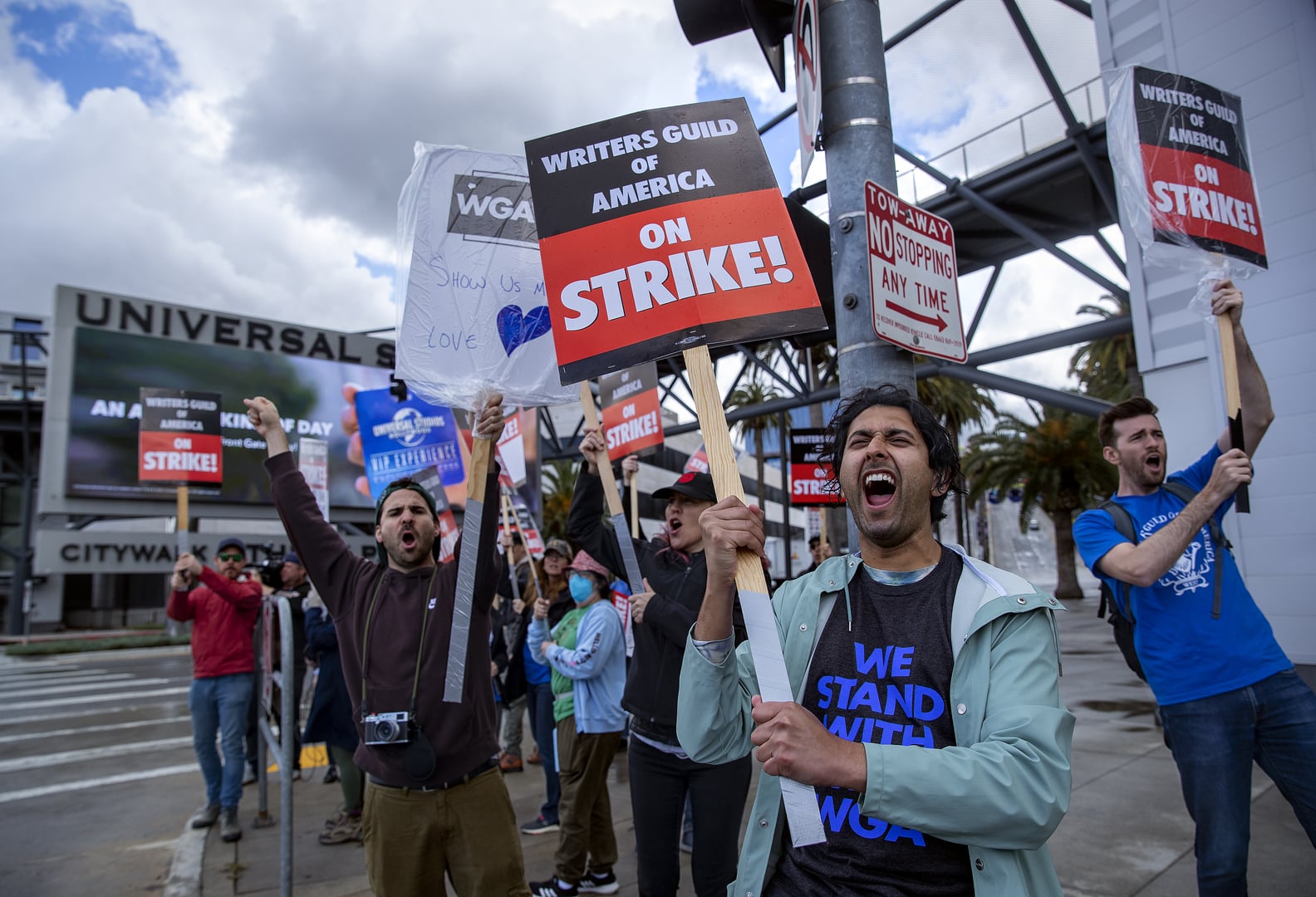Hollywood Production Frozen: The Combined Writers' And Actors' Strike

Table of Contents
Key Demands of the WGA and SAG-AFTRA
The Hollywood production frozen is a direct result of significant disagreements between the unions and the Alliance of Motion Picture and Television Producers (AMPTP). Both the WGA and SAG-AFTRA are fighting for crucial improvements in working conditions and compensation.
Fair Wages and Residuals in the Streaming Era
Traditional compensation models, built around network television, are woefully inadequate in the age of streaming. Streaming platforms generate billions in revenue from shows, yet writers and actors often receive paltry residuals, a stark contrast to the lucrative syndication deals of the past. This disparity is a major point of contention fueling the Hollywood production frozen.
- Specific demands regarding residuals: The unions are pushing for a fairer share of streaming revenue, tied to viewership numbers and platform profitability. They are seeking transparency in how streaming platforms calculate and distribute these residuals.
- Impact of AI on residuals: The rise of AI in content creation is another critical concern. The unions are demanding safeguards to prevent the use of AI to replace writers and actors, and to ensure fair compensation when AI is used in the creative process. The fear is that AI could drastically reduce the need for human creatives, further diminishing their earning potential.
Protecting Creative Control and Working Conditions
Beyond financial concerns, the strikes address crucial issues of creative control and working conditions. The current system, according to the unions, often leads to exploitative practices.
- Excessive working hours and demanding schedules: Many writers and actors report unsustainable working hours and pressure to compromise creative vision to meet tight deadlines.
- The fight against AI: The unions are united in their opposition to the use of AI to replace human creativity. They are seeking guarantees that AI will not be used to undermine their roles and diminish their value.
- Specific demands related to creative control and on-set conditions: The unions are pushing for improved safety regulations on set, fair treatment by producers, and greater input in the creative process. This includes protections against exploitative contracts and working environments.
The Economic Impact of the Hollywood Production Frozen
The Hollywood production frozen isn't just a creative crisis; it's a significant economic event with far-reaching consequences.
Financial Losses for Studios and Production Companies
The ongoing strike is costing studios and production companies billions of dollars. Major film and television projects are on hold, delaying releases and impacting marketing campaigns.
- Quantifiable estimates of financial losses: While precise figures are difficult to obtain, industry analysts predict massive losses, impacting the bottom lines of major studios and independent production companies alike.
- Impact on related industries: The ripple effects extend beyond the studios. Industries such as catering, transportation, and post-production are experiencing significant job losses and reduced revenue.
- Analysis of stock market responses: The strike has already impacted the stock prices of major entertainment companies, reflecting investor concern about the financial implications of the prolonged shutdown.
Ripple Effects on the Global Economy
The Hollywood production frozen isn't confined to the US. Its impact extends globally.
- Impact on tourism in filming locations: Many regions rely on film and television production for tourism revenue. The strike directly affects these local economies, resulting in job losses and decreased economic activity.
- Disruption of the global distribution and marketing of films and television shows: The delayed release of films and shows impacts global distribution networks and marketing campaigns, causing further financial losses and disrupting international entertainment schedules.
- Potential effects on employment in related sectors worldwide: The Hollywood production frozen impacts employment not only in the US but also in countries that provide services to the film and television industry, such as post-production facilities and VFX studios.
Potential Solutions and Outcomes of the Hollywood Production Frozen
The resolution to the Hollywood production frozen hinges on successful negotiations.
Negotiations and Potential Compromises
The AMPTP and the unions are currently engaged in negotiations, but progress has been slow.
- Analysis of the current negotiation status: The main sticking points remain fair wages, residuals, and the use of AI. Both sides need to find common ground to end the strike.
- Discussion of potential compromises: Potential compromises could include tiered residual structures based on viewership, safeguards against AI misuse, and improved working conditions.
- Expert opinions on the likelihood of a swift resolution: Experts are divided on the likelihood of a quick resolution, with some suggesting a protracted negotiation process lasting weeks or even months.
Long-Term Implications for the Entertainment Industry
The Hollywood production frozen, regardless of its duration, will have a lasting impact on the industry.
- Potential changes to production models and compensation structures: The strike may lead to significant changes in how films and television shows are produced and compensated, potentially impacting the roles of writers and actors.
- The long-term impact of AI on the creative process: The ongoing debate surrounding AI's role in content creation will continue to shape industry practices and employment models.
- Changes in the power dynamic between studios, writers, and actors: The strike could shift the power dynamic between studios and creative talent, potentially leading to greater union influence in contract negotiations and industry practices.
Conclusion
The Hollywood production frozen caused by the combined WGA and SAG-AFTRA strike is an unprecedented event with far-reaching consequences for the entertainment industry and the global economy. The core issues—fair wages, residuals in the streaming era, and protection against the misuse of AI—highlight the need for significant reform within the industry. The ultimate outcome of the strike will shape the future of television and film production, influencing everything from compensation models to creative control. Staying informed about the progress of negotiations and potential solutions is crucial. Continue to follow the developments related to the Hollywood Production Frozen to understand the evolving landscape of the entertainment industry.

Featured Posts
-
 Rosie Huntington Whiteley In White Lingerie Pure Elegance
May 02, 2025
Rosie Huntington Whiteley In White Lingerie Pure Elegance
May 02, 2025 -
 Lottery Results Wednesday April 30 2025
May 02, 2025
Lottery Results Wednesday April 30 2025
May 02, 2025 -
 1 Mayis Emek Hareketinin Gecmisi Ve Guenuemuezdeki Yansimalari
May 02, 2025
1 Mayis Emek Hareketinin Gecmisi Ve Guenuemuezdeki Yansimalari
May 02, 2025 -
 Loyle Carner Dublin 3 Arena Concert Announced
May 02, 2025
Loyle Carner Dublin 3 Arena Concert Announced
May 02, 2025 -
 Burlington Play Reading Group Celebrates 135 Years
May 02, 2025
Burlington Play Reading Group Celebrates 135 Years
May 02, 2025
